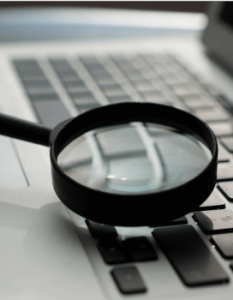Situations related to a tax inspection generally arouse fear and apprehension among taxpayers just after receiving a notice of the intended tax inspection. Indeed, a tax inspection is a procedure that goes far beyond the scope of verifying activities, whereby the tax authority, as a rule, verifies the timeliness and correctness of filed returns and paid taxes.
The scope of tax inspection is much broader and includes checking whether taxpayers comply with their obligations under substantive tax law. Such a broad definition of the purpose of a tax inspection and the much more serious consequences of irregularities found in the inspection protocol should motivate taxpayers to closely monitor whether the tax authority complied with all the requirements for conducting the inspection, especially at its initial stage. Taxpayers are also concerned about the possibility to carry out inspections remotely, which became possible from 24 June 2020. In this article, we present a synthetic discussion of the most important conditions for the initiation of a tax inspection.
A notice of intended tax inspection
Before the tax authority takes action in connection with the tax inspection, it must first notify the taxpayer of its intention to carry out the tax inspection. The notice contained in form ZAW-K should include all information required by the Tax Ordinance:
- designation of authority;
- date and place of issue;
- designation of the controlled person;
- indication of the scope of control;
- instruction on the right to submit a correction;
- signature of the person authorised to issue a notice.
Although the authority rarely makes mistakes at this stage, all elements of the above statement should be followed. In the event that the notice was not delivered or did not contain the information indicated above, a taxpayer may, pursuant to the Law of Entrepreneurs, file an objection with the tax authority within 3 working days from the date of commencement of the tax inspection or from the date on which the premises for objection occurred. In addition, evidence collected in the course of a tax inspection in violation of the provisions of law may not constitute evidence in administrative, tax, criminal or fiscal criminal proceedings.
The tax authority commences the tax inspection no earlier than after the lapse of 7 days and no later than before the lapse of 30 days from the date of delivery of the notice to the taxpayer. Although it is possible to initiate tax inspection before the lapse of 7 days, it is possible only with the consent or upon application of the controlled person.
It should be noted that in the period from the date of receipt of the notice to the date of commencement of the tax inspection, the taxpayer may correct his tax settlements, except for the inapplicability of the reduced tax interest rate by 50%.
Right to perform tax inspection without notice
There are grounds that allow the tax authority to initiate a tax inspection without notice. These include, inter alia:
- determination of the validity of the refund of tax difference or the refund of accrued tax within the meaning of the provisions on the goods and services tax;
- request of the tax inspection by an authority conducting pre-trial proceedings involving crime or fiscal crime;
- conduction of an tax inspection on the basis of information obtained pursuant to the provisions on preventing money laundering and terrorist financing;
- suspicion of taxation of income not covered by the revealed sources or coming from undisclosed sources;
- suspicion of failure to declare economic activity for taxation.
The authority also refrains from providing the taxpayer with a notice when:
- taxpayer has been validly sentenced in the Republic of Poland for committing the following offences: a fiscal offence, an offence against economic turnover, an offence under the Accounting Act or an offence involving obstruction of tax inspection;
- taxpayer is liable in administrative enforcement proceedings;
- taxpayer has no place of residence or seat or the delivery of letters was difficult or impossible.
Authority’s knowledge vs. justified suspicion of the facts, which justify lack of notice of intended tax inspection
The authority is obliged to inform the taxpayer of any lack of notice of the intended tax inspection in a tax inspection minutes. This means that communicating to the taxpayer the reasons for the lack of notice in verbal form is not acceptable. The tax authority, in addition to citing the legal basis for lack of the notice of intended tax inspection, should also cite the circumstances that justify such a decision. In the case of some of the above prerequisites, i.e. performance of an tax inspection with regard to VAT refund or criminal or fiscal offence, the authority has knowledge of the facts which were the reason for the lack of notice.
The premises, such as failure to disclose revenue from undisclosed sources or failure to declare business activity by the controlled person, are based only on a justified suspicion of the authority that the taxpayer committed the above violations. This suspicion should be confirmed in the course of a tax inspection, what is very important.
Interestingly, the tax authority may also not notify the taxpayer about the extension of the scope of the tax inspection to other periods, if irregularities have been identified during the current tax inspection.
Tax inspection “by ID card”
A tax authority initiates a tax inspection on the basis of an identity card alone if the inspection activities are necessary to prevent a fiscal crime or petty offence or to secure evidence thereof. The tax authority is obliged to provide, within 3 working days from the date of initiation of the tax inspection, an authorisation to conduct the control. The decision to institute a tax inspection on the basis of an official ID card is taken on suspicion of committing a tax offence consisting in tax evasion (failure to disclose the tax subject or tax base) or tax fraud. Unfortunately, this premise is abused by tax authorities, all the more so as it is difficult to justify the prevention of the commission of fiscal offences in relation to past periods.
Personal authorisation to conduct a tax inspection
A personal authorisation to conduct a tax inspection should absolutely contain the following elements:
- identification of the authority, date and place of issue;
- indication of the legal basis;
- the name and surname of the controller(s);
- number of the identity card of the inspector(s);
- designation of the inspected person(s);
- determination of the scope of the inspection;
- date of beginning and expected date of completion of the inspection;
- signature of the person granting the authorisation, indicating the position or function occupied;
- instruction about the rights and obligations of the controlled person resulting from the provisions of this section;
- indication of information on the processing of personal data referred to in Regulation 2016/679.
The absence of any of the above elements makes it impossible to conduct a tax inspection. Particular attention should be paid to the exact date of commencement of the inspection and the expected date of its completion, which are often forgotten by the tax authorities in the authorisation provided to the taxpayer.
Initiation of a tax inspection
A tax inspection shall be commenced upon delivery to the taxpayer of an authorisation to conduct the inspection, together with presentation of an official ID card of an employee of the authority. This action may take place in a place agreed between the taxpayer and the tax authority, in the taxpayer’s registered office, in the place of business or in the seat of the tax authority. If the audited person is absent, the tax authority shall summon him to appear within 7 days at the seat of the tax authority. In the event of expiry of this deadline, a tax inspection shall be deemed to have been initiated on the day of its expiry. Since 24 June 2020 it is possible to conduct a tax inspection remotely.
Termination of a tax inspection
A tax inspection should be completed without undue delay, in accordance with the deadline indicated in the personal authorisation. Whenever a tax inspection is not completed by the indicated deadline, the tax authority is obliged to notify the taxpayer of this fact in writing, setting another date for completion of the tax inspection. In accordance with the judgment of the Supreme Court of 30 August 2017 (ref. I FSK 756/17), it is insufficient for the controlling authority to refer to the moment of completion of the verification procedure. In this situation, it is necessary to indicate a specific date of completion of the extended tax inspection. In the light of the polish Law of Entrepreneurs, a tax inspection should not exceed in one calendar year with regard to:
- microentrepreneurs – 12 days;
- small entrepreneurs – 18 days;
- medium-sized entrepreneurs – 24 days;
- large entrepreneurs – 48 days.
According to the landmark ruling of the Supreme Administrative Court of 19 February 2020 (Case No. I FSK 2243/19), tax authorities have the time to conduct a tax inspection counting consecutive days, and not, as previously allowed, any days of the year. This meant that a tax inspection could actually last for the whole year, 1 day in each month.
How to prepare for a tax audit?
In my opinion, upon receipt of a notice of intended tax inspection, taxpayers should:
- scrupulously check whether the tax authority has complied with all the conditions mentioned above, which enable it to conduct a tax inspection;
- review tax settlements or correct them;
- collect documentation that may prove very useful in the course of the tax inspection (printouts of invoices, registers, payment confirmations, contracts concluded with contractors, business correspondence).
The knowledge of procedures is the key to the proper course of a tax inspection and protection of taxpayer’s interests during its course. The support of a tax adviser at the stage of preparation for the tax inspection and in its course helps to improve the inspection process and reduce the stress of the controlled taxpayer.
I encourage you to contact our specialists.
Author:
Maciej Kozub, VAT Specialist






